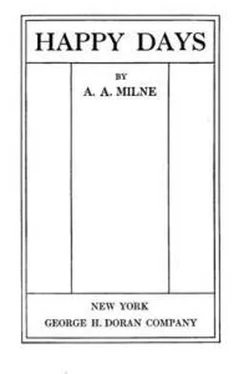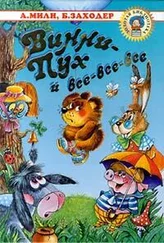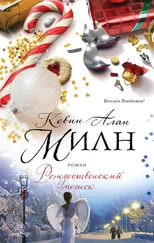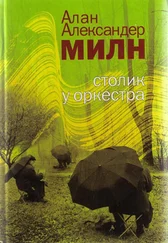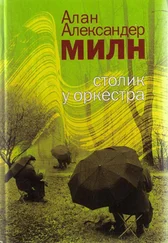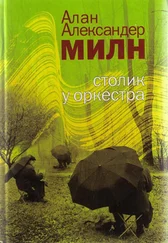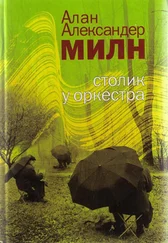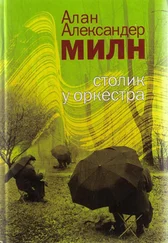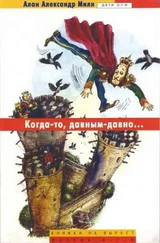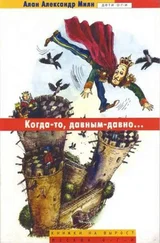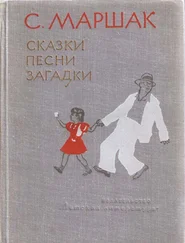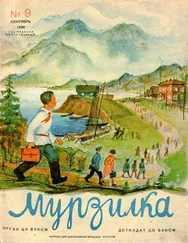Алан Милн - Happy Days
Здесь есть возможность читать онлайн «Алан Милн - Happy Days» весь текст электронной книги совершенно бесплатно (целиком полную версию без сокращений). В некоторых случаях можно слушать аудио, скачать через торрент в формате fb2 и присутствует краткое содержание. Год выпуска: 2014, Издательство: epubBooks Classics, Жанр: Юмористическая проза, на английском языке. Описание произведения, (предисловие) а так же отзывы посетителей доступны на портале библиотеки ЛибКат.
- Название:Happy Days
- Автор:
- Издательство:epubBooks Classics
- Жанр:
- Год:2014
- ISBN:нет данных
- Рейтинг книги:5 / 5. Голосов: 1
-
Избранное:Добавить в избранное
- Отзывы:
-
Ваша оценка:
- 100
- 1
- 2
- 3
- 4
- 5
Happy Days: краткое содержание, описание и аннотация
Предлагаем к чтению аннотацию, описание, краткое содержание или предисловие (зависит от того, что написал сам автор книги «Happy Days»). Если вы не нашли необходимую информацию о книге — напишите в комментариях, мы постараемся отыскать её.
Happy Days — читать онлайн бесплатно полную книгу (весь текст) целиком
Ниже представлен текст книги, разбитый по страницам. Система сохранения места последней прочитанной страницы, позволяет с удобством читать онлайн бесплатно книгу «Happy Days», без необходимости каждый раз заново искать на чём Вы остановились. Поставьте закладку, и сможете в любой момент перейти на страницу, на которой закончили чтение.
Интервал:
Закладка:
I met Prosper Vane at the club some ten days before the first night, and asked him how rehearsals were going.
"Oh, all right," he said. "But it's a rotten play. I've got such a dashed silly part."
"From what you told me," I said, "it sounded rather good."
"It's so dashed unnatural. For three whole Acts this girl and I are in love with each other, and we know we're in love with each other, and yet we simply fool about. She's a dashed pretty girl too, my boy. In real life I'd jolly soon―"
"My dear Alfred," I protested, "you're not going to fall in love with the girl you have to fall in love with on the stage? I thought actors never did that."
"They do sometimes; it's a dashed good advertisement. Anyway, it's a silly part, and I'm fed up with it."
"Yes, but do be reasonable. If Dick got engaged at once to Winifred what would happen to Levinski? He'd have nothing to do."
Prosper Vane grunted. As he seemed disinclined for further conversation, I left him.
The opening night came, and the usual distinguished and fashionable audience (including myself) such as habitually attends Mr. Levinski's first nights, settled down to enjoy itself. Two Acts went well. At the end of each Mr. Levinski came before the curtain and bowed to us, and we had the honour of clapping him loud and long. Then the Third Act began….
Now this is how the Third Act ends:
Exit Sir Geoffrey.
Winifred (breaking the silence). Dick, you heard what he said. Don't let this silly money come between us. I have told you I love you, dear. Won't you—won't you speak to me?
Dick. Winifred, I― (He gets up and walks round the room, his brow knotted, his right fist occasionally striking his left palm. Finally, he comes to a stand in front of her.) Winifred, I― (He raises his arms slowly at right angles to his body and lets them fall heavily down again.) I can't. (In a low hoarse voice) I—can't! (He stands for a moment with bent head; then with a jerk he pulls himself together.) Good–bye! (His hands go out to her, but he draws them back as if frightened to touch her. Nobly.) Good–ber–eye.
He squares his shoulders and stands looking at the audience with his chin in the air; then with a shrug of utter despair, which would bring tears into the eyes of any young thing in the pit, he turns and with bent head walks slowly out.
CURTAIN.
That is how the Third Act ends. I went to the dress rehearsal, and so I know.
How the accident happened I do not know. I suppose Prosper was nervous. I am sure he was very much in love. Anyhow, this is how, on that famous first night, the Third Act ended:
Exit Sir Geoffrey.
Winifred (breaking the silence). Dick, you heard what he said. Don't let this silly money come between us. I have told you I love you, dear. Won't you—won't you speak to me?
Dick (jumping up). Winifred I― (with a great gulp) I LOVE YOU!!!
Whereupon he picked her up in his arms and carried her triumphantly off the stage … and after a little natural hesitation the curtain came down.
Behind the scenes all was consternation. Mr. Levinski (absolutely furious) had a hasty consultation with the author (also furious), in the course of which they both saw that the Fourth Act as written was now an impossibility. Poor Prosper, who had almost immediately recovered his sanity, tremblingly suggested that Mr. Levinski should announce that, owing to the sudden illness of Mr. Vane the Fourth Act could not be given. Mr. Levinski was kind enough to consider this suggestion not entirely stupid; his own idea having been (very regretfully) to leave out the two parables and three reminiscences from India, and concentrate on the love–scene with the widow.
"Yes, yes," he said. "Your plan is better. I will say you are ill. It is true; you are mad. To–morrow we will play it as it was written."
"You can't," said the author gloomily. "The critics won't come till the Fourth Act and they'll assume that the Third Act ended as it did tonight. The Fourth Act will seem all nonsense to them."
"True. And I was so good, so much myself in that Act." He turned to Prosper. "You—fool!"
"Or there's another way," began the author. "We might―"
And then a gentleman in the gallery settled it from the front of the curtain. There was nothing in the programme to show that the play was in four Acts. "The Time is the present–day and the Scene is in Sir Geoffrey Throssell's town–house," was all it said. And the gentleman in the gallery, thinking it was all over, and being pleased with the play and particularly with the realism of the last moment of it, shouted, "Author." And suddenly everybody else cried, "Author! Author." The Play was ended.
I said that this was the story of a comedy which nearly became a tragedy. But it turned out to be no tragedy at all. In the three Acts to which Prosper Vane had condemned it the play appealed to both critics and public, for the Fourth Act (as he recognised so clearly) was unnecessary, and would have spoilt the balance of it entirely. Best of all, the shortening of the play demanded that some entertainment should be provided in front of it, and this enabled Mr. Levinski to introduce to the public Professor Wollabollacolla and Princess Collabollawolla, the famous exponents of the Bongo–Bongo, that fascinating Central African war dance, which was soon to be the rage of society. But though, as a result, the takings of the Box Office surpassed all Mr. Levinski's previous records, our friend Prosper Vane received no practical acknowledgment of his services. He had to be content with the hand and heart of the lady who played Winifred , and the fact that Mr. Levinski was good enough to attend the wedding. There was, in fact, a photograph in all the papers of Mr. Levinski doing it.
XVI
The Doctor
"May I look at my watch?" I asked my partner, breaking a silence which had lasted from the beginning of the waltz.
"Oh, have you got a watch?" she drawled. "How exciting!"
"I wasn't going to show it to you," I said. "But I always think it looks so bad for a man to remove his arm from a lady's waist in order to look at his watch—I mean without some sort of apology or explanation. As though he were wondering if he could possibly stick another five minutes of it."
"Let me know when the apology is beginning," said Miss White. Perhaps, after all, her name wasn't White, but, anyhow, she was dressed in White, and it's her own fault if wrong impressions arise.
"It begins at once. I've got to catch a train home. There's one at 12.45, I believe. If I started now I could just miss it."
"You don't live in these Northern Heights, then?"
"No. Do you?"
"Yes."
I looked at my watch again.
"I should love to discuss with you the relative advantages of London and Greater London," I said; "the flats and cats of one and the big gardens of the other. But just at the moment the only thing I can think of is whether I shall like the walk home. Are there any dangerous passes to cross?"
"It's a nice wet night for a walk," said Miss White reflectively.
"If only I had brought my bicycle."
"A watch and a bicycle! You are lucky!"
"Look here, it may be a joke to you, but I don't fancy myself coming down the mountains at night."
"The last train goes at one o'clock, if that's any good to you."
"All the good in the world," I said joyfully. "Then I needn't walk." I looked at my watch. "That gives us five minutes more. I could almost tell you all about myself in that time."
Читать дальшеИнтервал:
Закладка:
Похожие книги на «Happy Days»
Представляем Вашему вниманию похожие книги на «Happy Days» списком для выбора. Мы отобрали схожую по названию и смыслу литературу в надежде предоставить читателям больше вариантов отыскать новые, интересные, ещё непрочитанные произведения.
Обсуждение, отзывы о книге «Happy Days» и просто собственные мнения читателей. Оставьте ваши комментарии, напишите, что Вы думаете о произведении, его смысле или главных героях. Укажите что конкретно понравилось, а что нет, и почему Вы так считаете.
